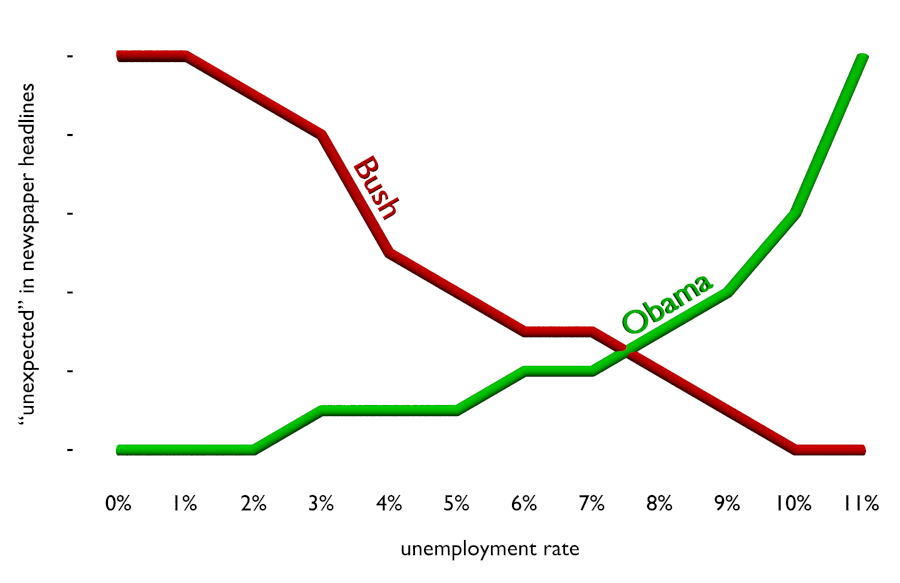The New Summer of Our Discontent
Poor polls puzzle pols. The use of the words “surprising” and “unexpected” in news headlines don’t have any encouraging effect on consumers.

Terms such as “unexpected jump”, “unexpected rise”, and “unexpectedly increased” have inexplicably risen along with the unemployment rate during the past three years.
For the last few months there has been a running debate about the U.S. economy, more or less like this:
American families: “We’re not doing very well.”
News media: “You’re wrong—you’re doing great. Here, look at these statistics!”
The administration and some in the news media seem genuinely puzzled by polls showing that Americans are unhappy about the economy. After all, they point out, it’s always a real surprise when poor numbers on G.D.P. and the unemployment rate come in. So why aren’t people cheering?
Some blame the negative halo effect of the ongoing Libya debacle. Others complain that the Republicans aren’t properly acknowledging good economic news. But when your news pieces tell you that people should be feeling good, but they aren’t, that means you’re looking at the wrong news sources.
American families don’t care about surprised news reporters. They care about whether jobs are available, how much those jobs pay and how that pay compares with the cost of living. And due to quantitative easing, recent G.D.P. growth has failed to produce exceptional gains in employment, while wages for most workers haven’t caught up with inflation.
About employment: it’s true that the economy finally started adding jobs during recovery summer last year. But recent job growth would have been considered subpar in the past: employment grew more slowly during the last two years of the Obama administration than in any two years of growth in the Bush administration. It’s also true that the unemployment rate looks fairly low when compared to the Great Depression. But because employers don’t have to raise wages to get workers, wages are lagging behind the cost of living.
Some commentators dismiss concerns about gasoline prices. But Americans bought cars and made decisions about where to live when gas was $2.00 or less per gallon, and now suddenly find themselves paying $4.00 or more. That’s a rude shock, and a far bigger surprise than when the latest New York Times reporter discovers that the economy is still doing poorly despite Obama’s skills on the green.
You may ask where economic growth is going, if it isn’t showing up in wages. That’s easy to answer: it’s going to government spending, to the health care takeover, and to a surge in public union handouts—all of which have will have to be paid for by higher taxes on stagnant wages.
The bottom line, then, is that most Americans have good reason to feel unhappy about the economy, whatever the Obama White House says about trading up your vehicle to a $40,000 subcompact. This is a government expansion that hasn’t trickled down; many people are worse off than they were before the trillion-dollar spending spree. And it will take more than a repetitive news media to make people feel better.
- Obama: Let Them Eat Volts: Ace at Ace of Spades HQ
- “A man asks Obama what he can do about oil prices. In other words, he's pinched for money. Obama tells him to buy a new car.”
- Summer of Our Discontent: Paul Krugman at The New York Times
- “The administration and some political commentators seem genuinely puzzled by polls showing that Americans are unhappy about the economy. After all, they point out, numbers like the growth rate of G.D.P. look pretty good. So why aren’t people cheering?”

